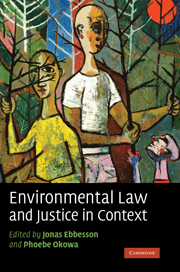Book contents
- Frontmatter
- Contents
- List of contributors
- Preface and acknowledgments
- 1 Introduction: dimensions of justice in environmental law
- Part I The notion of justice in environmental law
- Part II Public participation and access to the judiciary
- Part III State sovereignty and state borders
- Part IV North–South concerns in global contexts
- Part V Access to natural resources
- 18 Distributive justice and procedural fairness in global water law
- 19 Environmental justice in the use, knowledge and exploitation of genetic resources
- 20 Law, gender and environmental resources: women's access to environmental justice in East Africa
- Part VI Corporate activities and trade
- Index
- References
19 - Environmental justice in the use, knowledge and exploitation of genetic resources
from Part V - Access to natural resources
Published online by Cambridge University Press: 28 June 2009
- Frontmatter
- Contents
- List of contributors
- Preface and acknowledgments
- 1 Introduction: dimensions of justice in environmental law
- Part I The notion of justice in environmental law
- Part II Public participation and access to the judiciary
- Part III State sovereignty and state borders
- Part IV North–South concerns in global contexts
- Part V Access to natural resources
- 18 Distributive justice and procedural fairness in global water law
- 19 Environmental justice in the use, knowledge and exploitation of genetic resources
- 20 Law, gender and environmental resources: women's access to environmental justice in East Africa
- Part VI Corporate activities and trade
- Index
- References
Summary
Introduction
Access to and use of genetic resources have become increasingly contentious at the national and international levels over the past couple of decades. The importance of genetic resources in law and policy debates in recent years has largely been linked to their new-found economic importance in the context of the development of agricultural and pharmaceutical biotechnology. As a result, questions concerning transfers of and trade in genetic resources as well as questions concerning the protection of knowledge related to genetic resources have been given a lot of attention by policy-makers.
This has resulted in a flurry of new rules and regulations fostering the use of genetic resources, for instance, as a raw material for biotechnology products. In particular, the use of genetic resources in transgenic products has been encouraged by the progressive introduction in most countries of patents on life forms in the context of the implementation of the Agreement on Trade-Related Aspects of Intellectual Property Rights (TRIPS).
While legal incentives for the use of genetic resources in industrial applications have rapidly developed over the past couple of decades, much less has been done with regard to the protection of the rights and interests of the holders of genetic resources and associated knowledge concerning their useful characteristics. Nevertheless, a number of initiatives have been taken in different contexts. The 1992 Convention on Biological Diversity (‘Biodiversity Convention’) has been one of the focal points for addressing some of the concerns related to access to and use of genetic resources.
- Type
- Chapter
- Information
- Environmental Law and Justice in Context , pp. 371 - 389Publisher: Cambridge University PressPrint publication year: 2009
References
- 1
- Cited by



